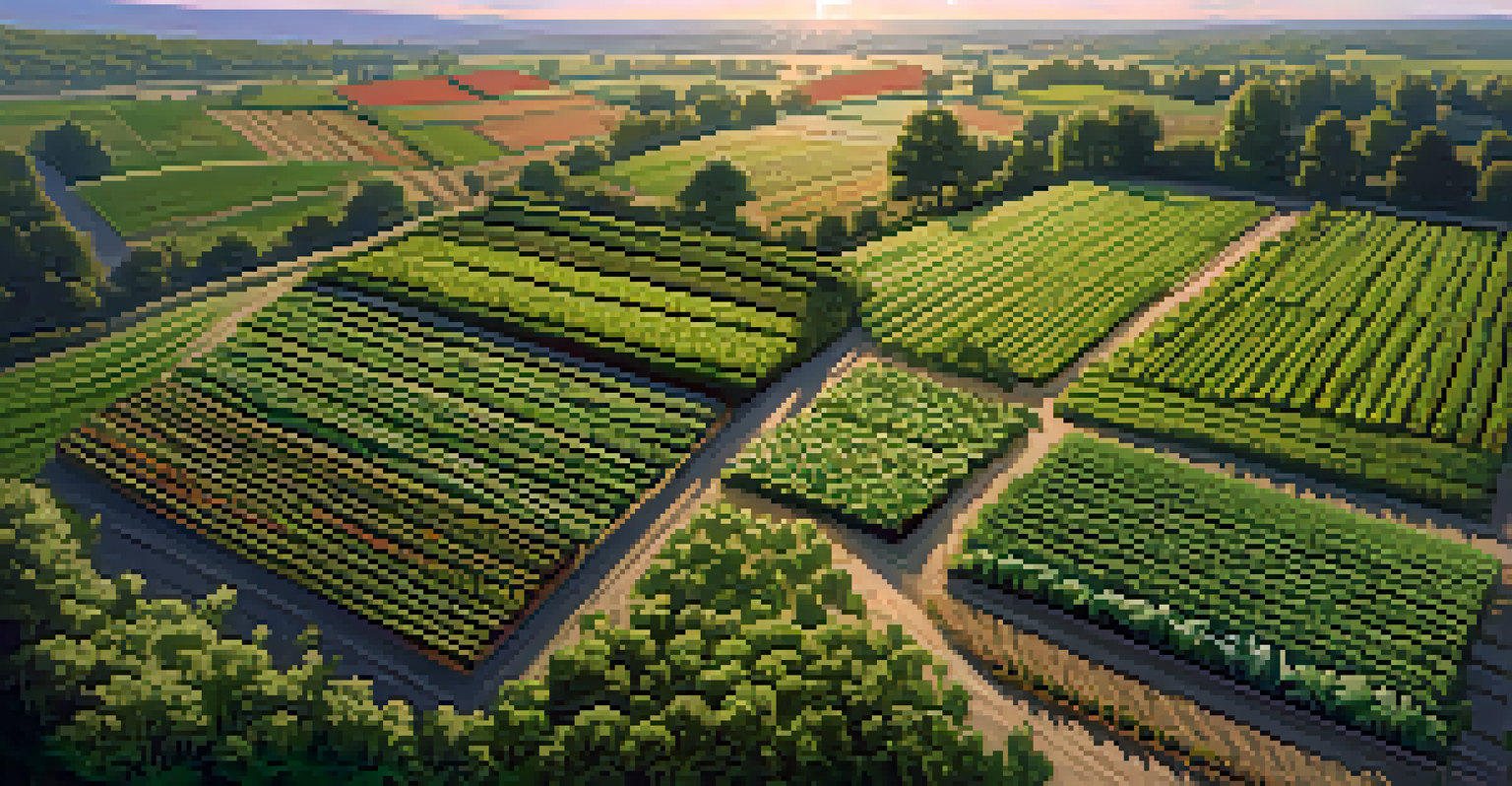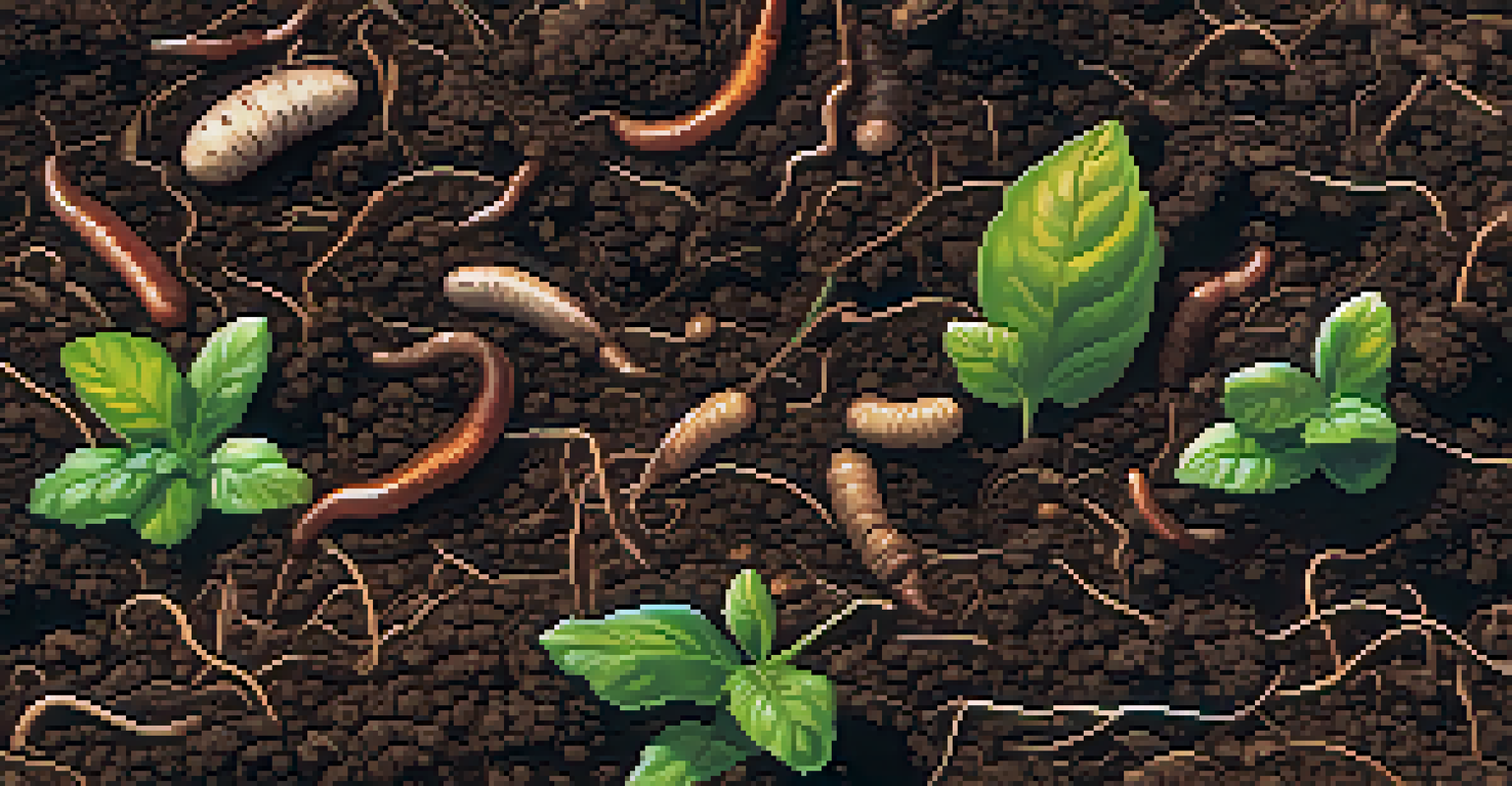The Impact of Vegan Food on Soil Health and Sustainability

Understanding Veganism and Its Core Principles
Veganism is more than just a diet; it's a lifestyle that avoids animal products. This conscious choice reflects a commitment to animal welfare, health, and environmental sustainability. By eliminating meat and dairy, vegans aim to reduce their ecological footprint.
The health of our soil is vital to our survival; it is the foundation of our food system and essential for biodiversity.
The principles of veganism align closely with sustainable practices, emphasizing plant-based foods that require fewer resources to produce. For instance, growing vegetables generally uses less water and land compared to raising livestock. This shift can lead to a healthier planet.
Moreover, the rise in vegan diets encourages agricultural systems that focus on diverse crops, enhancing biodiversity. As more people choose plant-based options, farmers are incentivized to explore sustainable farming practices that benefit both the environment and soil health.
Soil Health: The Foundation of Sustainable Agriculture
Soil health is crucial for sustainable agriculture as it directly affects crop productivity and ecosystem balance. Healthy soil is rich in organic matter, nutrients, and microbial life, which supports plant growth and resilience. When we prioritize soil health, we ensure the long-term viability of our food systems.

Conventional farming methods, often linked to animal agriculture, can degrade soil quality through excessive tilling and chemical inputs. In contrast, vegan farming practices prioritize crop rotation and cover cropping, which improve soil structure and fertility. These methods contribute to a more sustainable agricultural system.
Veganism Supports Sustainable Practices
Veganism promotes a lifestyle that reduces ecological impact through plant-based diets and sustainable farming.
By adopting vegan-friendly farming practices, we can enhance soil health, leading to reduced erosion and improved water retention. This not only benefits farmers but also supports local ecosystems, promoting a balanced relationship between agriculture and nature.
The Role of Plant-Based Diets in Soil Regeneration
Plant-based diets play a significant role in regenerating soil health. By reducing livestock farming, we can lower the pressure on soil resources, allowing for natural regeneration processes to take place. This creates an environment where soil can recover and thrive.
Eating a plant-based diet is not just a personal choice; it is a powerful way to contribute to the health of our planet.
Regenerative agricultural practices, such as permaculture and agroforestry, focus on restoring soil health while producing food. These methods often align with vegan principles, emphasizing the cultivation of diverse plant species that enrich the soil. As a result, they contribute to a more resilient ecosystem.
Additionally, incorporating compost and organic fertilizers into plant-based farming not only nourishes the soil but also reduces waste. By recycling organic matter back into the soil, we can enhance its health while promoting sustainability in food production.
Vegan Food Systems and Reduced Carbon Footprint
One of the most compelling arguments for veganism is its potential to reduce our carbon footprint. Livestock farming is a significant contributor to greenhouse gas emissions, while plant-based diets typically involve lower emissions. By choosing vegan foods, individuals can actively contribute to climate change mitigation.
The shift towards vegan food systems also supports sustainable land use. With less land needed for grazing and feed production, more space can be dedicated to growing diverse crops. This not only benefits the environment but also promotes food security and biodiversity.
Soil Health is Vital for Agriculture
Healthy soil is essential for productive agriculture and can be enhanced through vegan-friendly farming techniques.
As more people embrace plant-based diets, there is a growing demand for sustainable farming practices that prioritize carbon sequestration. By adopting techniques that store carbon in the soil, we can further enhance the positive impact of vegan food systems on the environment.
Biodiversity and Its Connection to Vegan Agriculture
Biodiversity is essential for healthy ecosystems and sustainable agriculture. Vegan agriculture supports biodiversity by promoting a variety of plant species, which can enhance soil health and resilience. This diversity helps create a balanced ecosystem that can withstand pests and diseases.
In contrast, monoculture practices, often associated with animal feed production, can harm biodiversity. When we focus on growing diverse, plant-based crops, we encourage a wider range of organisms to thrive in the soil. This, in turn, leads to healthier soil and improved agricultural productivity.
Moreover, diverse plant systems can provide habitats for beneficial insects and wildlife, further enriching the ecosystem. By supporting vegan agricultural practices, we can contribute to a more biodiverse and sustainable world.
Community and Local Food Systems in Veganism
Veganism often promotes local food systems, which can have a positive impact on soil health and sustainability. By sourcing food locally, communities can reduce transportation emissions and support local farmers. This fosters a more sustainable food network that benefits both the economy and the environment.
Community gardens and urban farming initiatives often focus on plant-based foods, allowing individuals to engage directly with their food sources. These practices not only enhance community bonds but also encourage sustainable land use and soil management techniques.
Biodiversity Boosts Ecosystem Resilience
Emphasizing diverse plant species in vegan agriculture fosters biodiversity, benefiting soil health and ecosystem stability.
Engaging in local food systems can also lead to a greater awareness of the importance of soil health. As communities come together to cultivate plant-based foods, they can share knowledge and practices that promote sustainability and enhance soil quality.
Challenges and Opportunities in Vegan Agriculture
While the benefits of vegan food on soil health and sustainability are clear, there are also challenges to consider. Transitioning to vegan agriculture may require significant changes in farming practices, education, and resource allocation. However, these challenges also present opportunities for innovation and collaboration.
Farmers and agricultural experts are increasingly exploring sustainable practices that align with vegan principles. By investing in research and development, we can discover new methods that enhance soil health while meeting the demands of a growing population. This collaborative approach can lead to more resilient food systems.

Ultimately, addressing the challenges of vegan agriculture is an opportunity to rethink our relationship with food and the environment. By embracing sustainable practices, we can create a future where both soil health and human nutrition are prioritized.